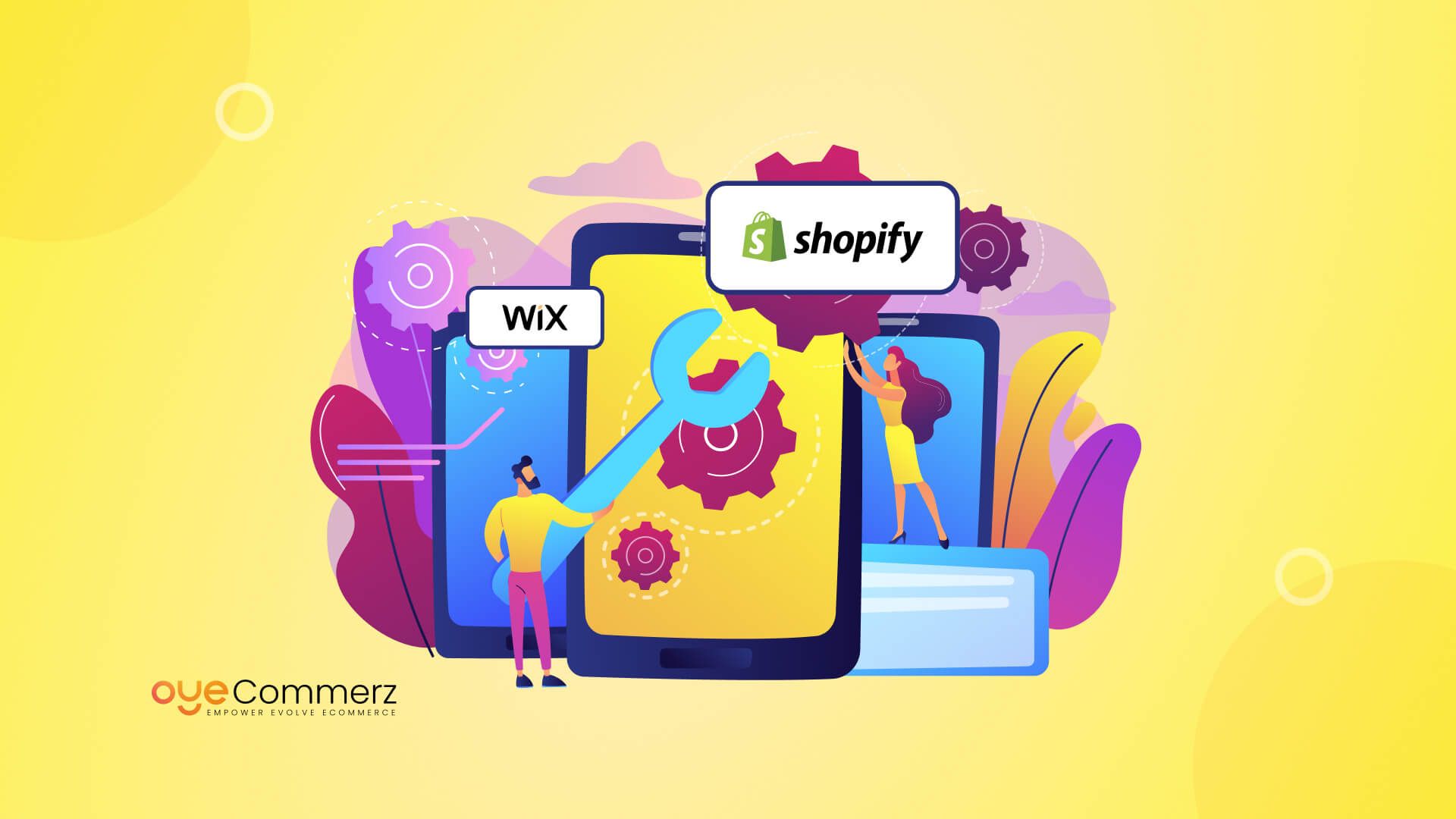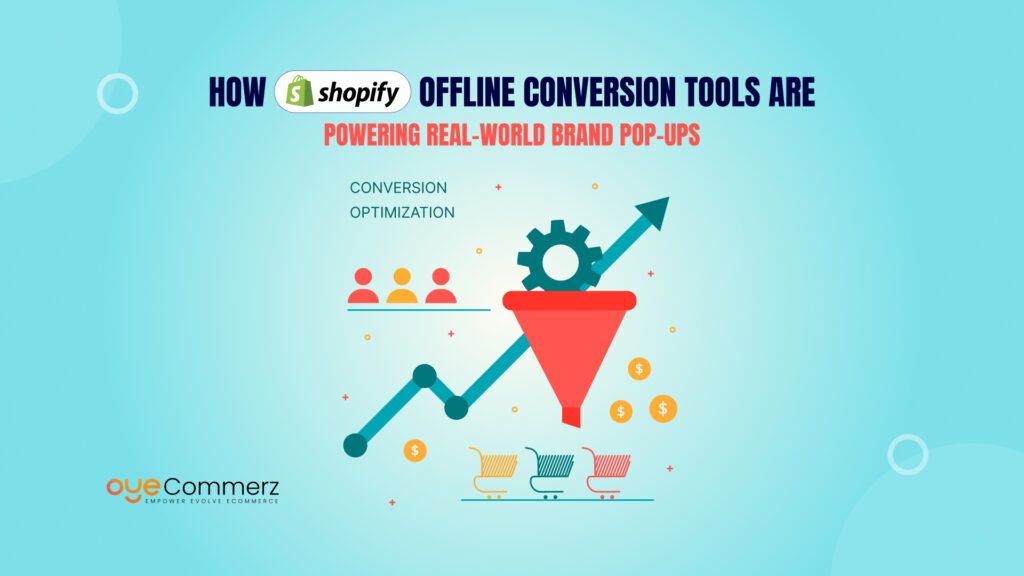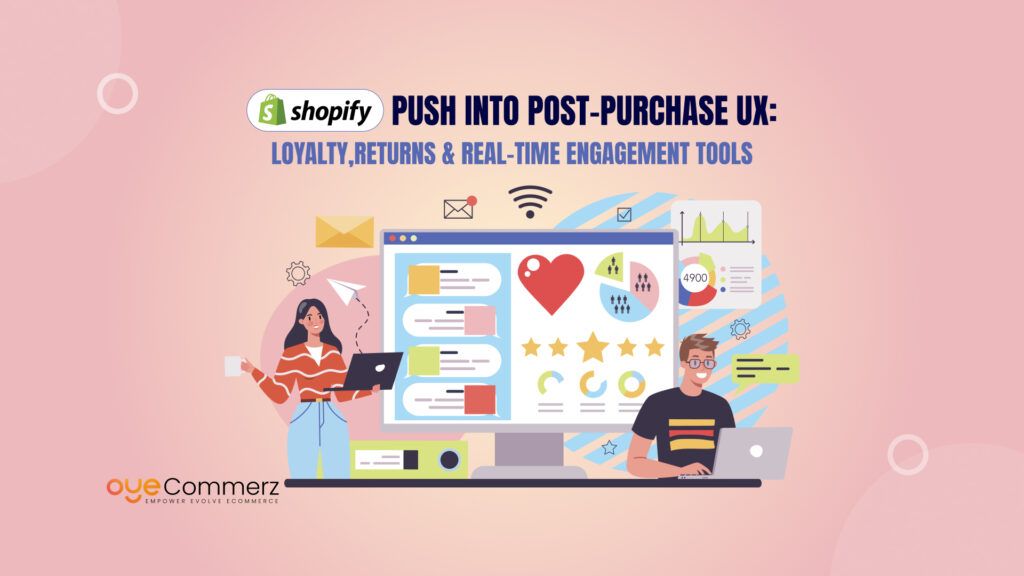Is your Wix store struggling to deliver a seamless experience on mobile devices? You’re not alone if you’ve noticed slow load times, clunky layouts, or frustrated customers dropping off. Mobile shopping now accounts for over 60% of online purchases, and if your store isn’t up to speed, you’re missing out.
For existing Wix store owners, this is the wake-up call you need. Shopify’s mobile-friendly design ensures your store works perfectly on any screen, helping keep customers engaged and boost sales effortlessly. In this blog, we’ll show you exactly why Shopify outshines Wix when it comes to mobile optimization and how making the switch can transform your e-commerce game.
Table of Contents
ToggleWhat is Mobile Optimization?
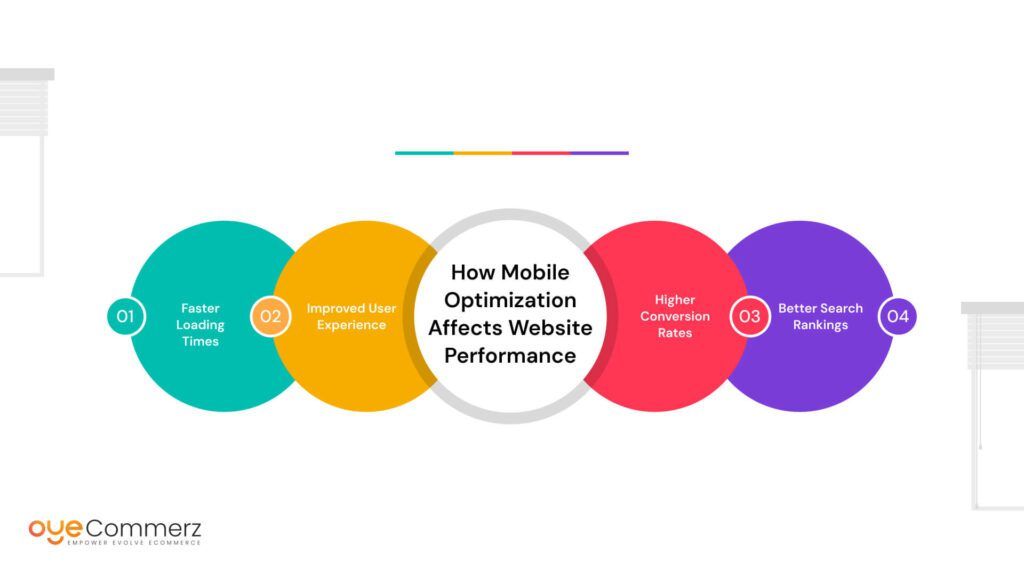
Mobile optimization refers to the process of ensuring a website adapts seamlessly to various screen sizes, primarily smartphones and tablets. This includes responsive layouts, fast load speeds, readable content, clickable buttons, and a streamlined user experience tailored to mobile users.
For eCommerce businesses, mobile optimization plays a critical role in:
- Enhancing customer experience.
- Boosting engagement and conversions.
- Reducing bounce rates and cart abandonments.
How Mobile Optimization Affects Website Performance
A well-optimized mobile site ensures the following:
- Faster Loading Times: Mobile users expect pages to load in under 3 seconds. Any delays lead to immediate drop-offs.
- Improved User Experience: Responsive design means no pinching, zooming, or scrolling endlessly—just smooth, hassle-free navigation.
- Higher Conversion Rates: Optimized mobile checkouts and faster payment gateways make purchasing simple and quick.
- Better Search Rankings: Google rewards mobile-friendly websites through its mobile-first indexing, improving search rankings for optimized stores.
Here’s a quick comparison table of key benefits:
Mobile optimization is not just an extra feature—it’s a core part of eCommerce success. Without it, businesses risk losing traffic, customers, and revenue.
Why Mobile Optimization Is Critical for eCommerce Success
Increasing Mobile Usage in the U.S.
The growth of mobile shopping in the U.S. cannot be ignored. Consider these compelling statistics:
- Over 60% of all eCommerce traffic now comes from mobile devices.
- By 2025, mobile commerce is projected to account for 44% of total eCommerce sales in the U.S.
These numbers highlight the undeniable shift in shopping behavior. Customers prefer the convenience of browsing and purchasing on their phones, making mobile optimization a necessity rather than an option.
Impact on Customer Experience
A poor mobile experience frustrates users and drives them away. Problems like slow-loading pages, broken layouts, and unreadable text make potential customers abandon your site and seek alternatives.
- 88% of online shoppers say they won’t return to a website after a bad mobile experience.
- Over 50% of users will leave a site if it takes more than 3 seconds to load.
The message is clear: mobile optimization directly influences customer satisfaction and retention.
Conversion and Revenue Loss
For eCommerce businesses, every second counts. A slow or poorly optimized mobile site doesn’t just frustrate users—it kills sales.
- A 1-second delay in page load time can lead to a 7% drop in conversions.
- Poor mobile UX increases cart abandonment, costing businesses millions annually.
On platforms like Wix, these challenges are more prominent due to slow mobile performance and manual adjustments. In contrast, Shopify ensures a mobile-friendly design out of the box, helping you retain customers and maximize revenue.
SEO and Search Ranking Penalties
Google’s mobile-first indexing prioritizes websites that are optimized for mobile devices. Sites that perform poorly on mobile are penalized with lower search rankings, meaning fewer customers can find your store.
- Shopify stores benefit from mobile-optimized themes and fast load speeds, improving SEO rankings.
- Wix stores, on the other hand, often face challenges with slower speeds and inconsistent designs.
Mobile optimization isn’t just about pleasing customers—it’s about being visible online. If your Wix site isn’t performing, switching to Shopify can help you achieve better SEO, higher visibility, and more traffic.
The Challenges of Mobile Optimization for Business Owners
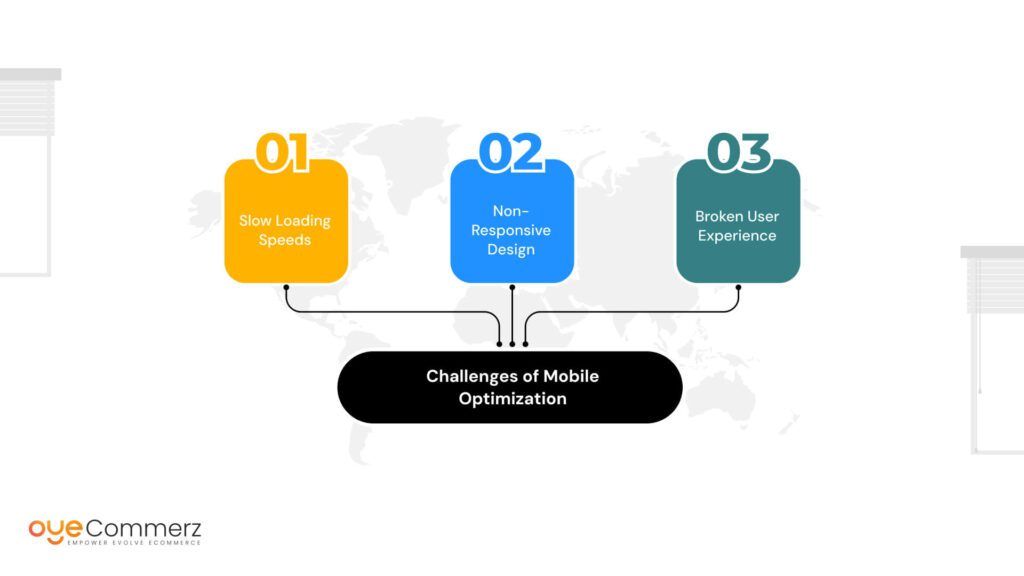
Mobile optimization is no longer an option—it’s a requirement. However, many business owners face significant challenges when ensuring their websites perform seamlessly on mobile devices. These challenges become especially evident on platforms like Wix, where achieving optimal mobile performance requires manual effort and extra time. Here’s a detailed breakdown of the key obstacles businesses face:
Slow Loading Speeds: Losing Customers in Seconds
Imagine this: A potential customer visits your online store, ready to make a purchase, but the website takes more than 3 seconds to load. The result? They leave and head to a competitor’s site. Slow loading speeds are one of the biggest reasons businesses lose out on mobile sales.
Why It Happens:
- Heavy Themes and Content: Many website builders, including Wix, use heavier themes that are not optimized for speed. Excessive images, videos, and animations add to the page weight, slowing down mobile performance.
- Inefficient Code: On platforms like Wix, the backend code can often include unnecessary bloat, leading to sluggish loading times.
- Manual Adjustments: Wix requires manual optimization to reduce load times, but even then, results can vary.
How Shopify Solves This Challenge:
- Optimized Themes: Shopify’s mobile-friendly themes are lightweight and optimized for faster load times out of the box.
- Efficient Infrastructure: Shopify’s global servers ensure fast delivery of content, even during peak traffic.
- Image Compression Tools: Shopify’s app store offers tools to compress and optimize images without compromising quality.
Non-Responsive Design: Creating Inconsistent User Experiences
A non-responsive design can instantly ruin the customer experience. If your website doesn’t adjust properly to different screen sizes—whether it’s a smartphone, tablet, or desktop—it frustrates users and drives them away.
The Problem with Wix:
- Manual Tweaks: Wix’s mobile editor requires business owners to manually adjust designs for mobile screens. This time-consuming process often leads to inconsistencies when switching between devices.
- Broken Layouts: Text overlaps, buttons don’t align, and images may appear stretched or distorted, creating a messy, unprofessional look.
- Time-Intensive Edits: Business owners waste hours making adjustments that still fail to provide a seamless experience for mobile users.
Why It Matters:
- 57% of internet users say they won’t recommend a business with a poorly designed mobile site.
- Google penalizes non-responsive designs in search rankings, reducing visibility and traffic.
Shopify’s Solution: Mobile-Friendly Shopify Design
- Responsive by Default: All Shopify themes are built with a mobile-first approach, automatically adjusting to any screen size without manual effort.
- Consistent Experience: Shopify ensures a uniform and professional look across devices, whether it’s a smartphone, tablet, or desktop.
- No Design Bloat: Themes are clean, optimized, and easy to customize, so you can focus on running your business instead of fixing layouts.
Swiitching from Wix to Shopify eliminates the hassle of creating responsive designs manually. Business owners can focus on growth while Shopify ensures every customer gets a smooth, consistent experience across devices.
Broken User Experience: Frustrating Customers, Killing Sales
The user experience (UX) on mobile devices determines whether a customer stays on your site or leaves within seconds. A broken UX—common on platforms like Wix—includes:
- Cluttered Layouts: Overloaded content makes navigation confusing, especially on smaller screens.
- Tiny Buttons and Text: Users struggle to tap buttons or read product descriptions without zooming in.
- Navigation Issues: Menus and links fail to work smoothly, leading to frustration.
Why It Matters:
- 88% of online shoppers won’t return to a website after a poor mobile experience.
- A cluttered or broken UX can increase bounce rates, directly impacting revenue and SEO.
Wix’s Limitations in UX Optimization:
- Wix’s mobile editor doesn’t automatically optimize elements like button sizes, spacing, or text readability.
- Mobile UX often breaks when switching between templates or adding new content.
Shopify: Focused on Mobile UX
- Clean Layouts: Shopify’s themes prioritize clean, user-friendly designs that make browsing easy on mobile screens.
- Optimized Buttons and Menus: Buttons, menus, and call-to-action elements are optimized for touch, ensuring smooth navigation.
- Mobile UX Tools: Shopify’s app store provides tools to fine-tune mobile experiences, such as sticky navigation bars and mobile-specific pop-ups.
For business owners on Wix, delivering a seamless user experience can feel like an uphill battle. By switching to Shopify, you gain access to mobile-friendly tools and themes that provide a frictionless browsing experience, increasing customer satisfaction and sales.
Shopify vs. Wix: Mobile Optimization Face-Off
Mobile Optimization Features: Shopify Takes the Lead
When it comes to mobile optimization, Shopify takes the lead over Wix with its built-in tools, mobile-first approach, and seamless features that require minimal manual effort. Let’s break down why Shopify is superior:
Mobile-First Themes: Designed for Perfection
Shopify provides a wide selection of mobile-friendly Shopify design themes that are responsive out of the box. These themes are created with mobile users in mind, ensuring every page—whether it’s a product page, home page, or checkout—adjusts perfectly to any screen size.
On the other hand, Wix’s mobile editor requires manual adjustments for each screen size. Business owners must manually tweak their layouts to achieve responsiveness, which is time-consuming and often inconsistent.
Fast Loading Speeds for Mobile Performance
Shopify themes are optimized for speed, which directly improves the user experience. Faster loading times lead to lower bounce rates and higher conversions, especially on mobile devices. Wix, however, struggles with heavier themes that load slower, frustrating users and driving them away.
Mobile Checkout Optimization
Shopify leads with its streamlined, mobile-optimized checkout processes. The platform ensures that customers can easily make purchases on any device without encountering friction. Wix’s checkout process, by contrast, often requires further customization to make it mobile-friendly.
AMP Integration
Shopify supports Accelerated Mobile Pages (AMP), allowing mobile pages to load almost instantly. This is a huge advantage for businesses looking to improve their page speed and reduce drop-offs on mobile. Wix does not have AMP integration, which puts it behind Shopify in performance.
Third-Party Apps for Mobile UX
Shopify’s extensive app store offers a variety of tools to further improve mobile user experiences, such as:
- Image optimization tools.
- Mobile-specific pop-ups and sliders.
- Tools for sticky navigation and mobile forms.
Wix, by comparison, has a more limited app ecosystem, making it harder to enhance mobile user experiences without significant manual work.
Why It Matters: For business owners, Shopify’s mobile-friendly Shopify design eliminates the need for technical adjustments and manual fixes, allowing you to focus on scaling your business rather than fixing layouts.
Page Loading Speeds: Shopify Outperforms Wix
Page speed is critical for mobile users. Customers expect websites to load in under 3 seconds, and any delays lead to frustration, higher bounce rates, and lost sales. Shopify’s optimized infrastructure ensures fast mobile page speeds, whereas Wix often lags.
The Importance of Mobile Page Speed
- Bounce Rates: A 1-second delay can increase bounce rates by 32%.
- Conversions: Faster pages improve conversions—sites that load within 2 seconds have a 15% higher conversion rate compared to slower ones.
- SEO Rankings: Google prioritizes fast-loading websites in its mobile-first indexing, meaning faster pages rank higher in search results.
Shopify’s Optimized Performance
Shopify offers:
- Lightweight, Optimized Themes: Shopify’s themes are designed to load quickly, even with high-resolution images or videos.
- CDN Integration: Shopify uses a Content Delivery Network (CDN) to deliver content efficiently across the globe, ensuring faster load times for U.S. customers.
- Image Optimization: Shopify provides built-in tools and apps to compress images and improve load speeds without sacrificing quality.
Wix’s Struggle with Page Speeds
- Heavy Design Elements: Wix templates often include animations, large media files, and bloated code, leading to slower performance.
- Manual Fixes: Wix requires business owners to manually optimize pages, which can be complex and time-consuming.
- Inconsistent Results: Even after optimization, Wix websites often fail to deliver the same level of performance as Shopify.
Mobile Checkout Experience: Shopify Leads with Optimized Processes
The mobile checkout experience can make or break a sale. A smooth, fast, and frictionless checkout keeps customers engaged and ensures they complete their purchases. Shopify’s mobile-friendly checkout process outshines Wix, reducing cart abandonment and boosting revenue.
Wix’s Mobile Checkout Issues
- Manual Customization: Wix’s default mobile checkout often requires significant manual adjustments to make it user-friendly.
- Complicated Payment Flow: Multiple steps and slow-loading pages create friction, leading to higher abandonment rates.
- Payment Gateways: While Wix Payments is available, it lacks seamless integration with popular mobile wallets like Apple Pay and Google Pay.
Shopify’s Streamlined Mobile Checkout
Shopify simplifies the checkout process with:
- Pre-Built Mobile Checkout Flows: Shopify’s checkout is optimized for mobile out of the box, requiring no additional customization.
- One-Click Payments: Shopify integrates seamlessly with Apple Pay, Google Pay, PayPal, and Shopify Payments, allowing customers to complete purchases with a single tap.
- Faster Load Speeds: Shopify checkout pages load quickly, minimizing friction and ensuring a smooth experience.
- Secure and Reliable: Shopify checkout is PCI-compliant, providing secure payment processing to build customer trust.
- Cart Abandonment: Over 70% of mobile users abandon their carts due to slow or complicated checkout processes.
- Higher Conversions: Streamlined checkouts can increase mobile conversions by up to 35%.
Shopify’s mobile-optimized checkout ensures customers can complete purchases quickly and securely, leading to fewer drop-offs and more sales. In contrast, Wix’s checkout often falls short, requiring extra work to meet customer expectations.
Solutions for US Business Owners: Why You Should Choose Shopify
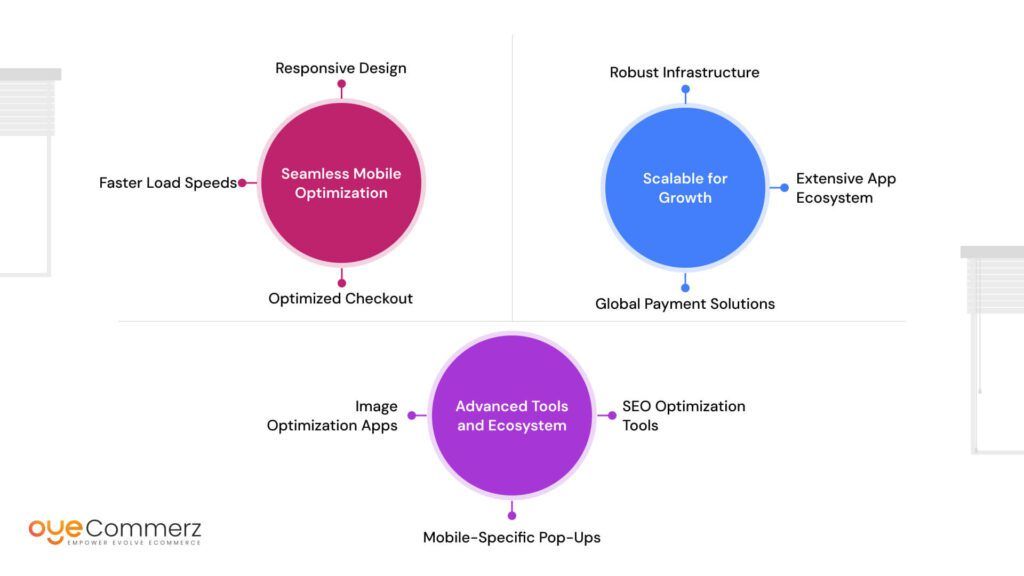
If you’re a U.S.-based business owner currently struggling with Wix’s limitations, switching to Shopify could be the turning point your store needs. Here’s why Shopify stands out as the ultimate solution for mobile optimization and eCommerce growth:
Seamless Mobile Optimization: Ready Out of the Box
Shopify eliminates the need for manual mobile adjustments. All themes are designed with a mobile-first approach, meaning your store will look professional and function seamlessly on smartphones and tablets right from the start.
- Responsive Design: Shopify themes adapt automatically to all screen sizes, offering a consistent experience.
- Faster Load Speeds: Shopify prioritizes speed with lightweight themes and efficient infrastructure, ensuring quick page loads for mobile users.
- Optimized Checkout: Shopify’s streamlined checkout process helps reduce cart abandonment rates, leading to more completed purchases.
Scalable for Growth: A Platform That Grows With You
Shopify is built to scale, whether you’re a small business starting or a large enterprise handling high traffic and sales volumes. Key advantages include:
- Robust Infrastructure: Shopify can handle thousands of concurrent visitors without compromising speed or performance.
- Extensive App Ecosystem: Shopify’s app store offers tools for everything from mobile UX enhancements to SEO optimization.
- Global Payment Solutions: Shopify integrates with Apple Pay, Google Pay, PayPal, and other popular gateways to provide a seamless mobile payment experience.
Wix, on the other hand, lacks the flexibility and tools needed for large-scale eCommerce growth, making Shopify the clear choice for ambitious businesses.
Advanced Tools and Ecosystem: Boost Your Mobile Success
Shopify offers a rich ecosystem of tools specifically designed to enhance mobile performance and user experience. These tools include:
- Image Optimization Apps: Improve page load speeds by compressing high-quality images.
- Mobile-Specific Pop-Ups: Increase engagement and conversions with targeted offers and promotions for mobile users.
- SEO Optimization Tools: Boost your store’s visibility on search engines with Shopify’s mobile-friendly SEO features.
With Shopify, U.S. business owners can leverage these tools to provide a professional, fast, and user-friendly mobile experience that drives growth and revenue.
Take the Leap Toward E-Commerce Excellence with OyeCommerz
Running an e-commerce business is challenging, but your platform shouldn’t add to the struggle. At OyeCommerz, we don’t just provide a solution; we deliver a foundation for success.
- Fast Deployment: Launch your store with speed and efficiency.
- Tailored Solutions: Customizable features to match your business goals.
- Expert Support: A dedicated team ready to assist whenever you need.
- Scalable Tools: Future-ready features to help you grow, stress-free.
Your store deserves a platform that supports you every step of the way. If you’re ready to experience a new level of reliability and results, it’s time to choose OyeCommerz.
Contact Us Today to Elevate Your E-Commerce Business.
Contact to Migrate your Site to Shopify Now
Conclusion
In today’s fast-paced digital world, mobile optimization isn’t optional—it’s a necessity. With more than 60% of e-commerce traffic coming from mobile devices, a seamless mobile experience can mean the difference between growth and stagnation. While platforms like Wix provide basic tools, their limitations in mobile performance and optimization can leave your business struggling to convert visitors into loyal customers.
In contrast, Shopify’s mobile-first approach ensures your store delivers an exceptional experience on any device. From responsive design and fast-loading pages to robust mobile checkout features, Shopify outshines Wix in delivering the tools you need to succeed in a mobile-dominant market.
If you’re serious about growing your e-commerce business, choose a platform that prioritizes mobile performance and puts your success first. Because in e-commerce, mobile optimization isn’t just an advantage—it’s the foundation for long-term success.
Switch to Shopify and give your customers the mobile experience they deserve.

